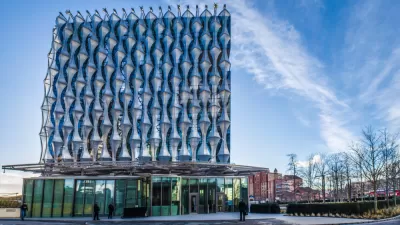California has long led the nation in efforts to reduce greenhouse gas emissions. A law approved in 2006 still provides direction for the state’s efforts.

The California Air Resources Board recently released a plan to achieve carbon neutrality in the state by 2045. The scoping plan, mandated by AB 32, California’s landmark climate change law approved in 2006, describes the path by which the state to reduce greenhouse gas emissions 40% by 2030 and 85 percent by 2045.
“By 2045, the plan envisions a thirty-fivefold increase in zero-emission vehicles and four times the amount of power generation from wind and solar energy — an increase that would avoid the need for new natural gas-burning power plants, officials say. The plan also anticipates that consumer demand for petroleum and natural gas will drop 86% in the next 23 years,” writes Tony Briscoe in an article for the Los Angeles Times.
As noted by Briscoe, the scoping plan is non-binding, so “It will be incumbent on lawmakers and government agencies to pass legislation, establish regulations and earmark funding for climate initiatives that achieve these targets.”
“And the state will need the cooperation of private industry and Californians.”
More specifics from the scoping plan are included in the article below.
FULL STORY: California unveils plan to reach carbon neutrality by 2045

Maui's Vacation Rental Debate Turns Ugly
Verbal attacks, misinformation campaigns and fistfights plague a high-stakes debate to convert thousands of vacation rentals into long-term housing.

Planetizen Federal Action Tracker
A weekly monitor of how Trump’s orders and actions are impacting planners and planning in America.

In Urban Planning, AI Prompting Could be the New Design Thinking
Creativity has long been key to great urban design. What if we see AI as our new creative partner?

King County Supportive Housing Program Offers Hope for Unhoused Residents
The county is taking a ‘Housing First’ approach that prioritizes getting people into housing, then offering wraparound supportive services.

Researchers Use AI to Get Clearer Picture of US Housing
Analysts are using artificial intelligence to supercharge their research by allowing them to comb through data faster. Though these AI tools can be error prone, they save time and housing researchers are optimistic about the future.

Making Shared Micromobility More Inclusive
Cities and shared mobility system operators can do more to include people with disabilities in planning and operations, per a new report.
Urban Design for Planners 1: Software Tools
This six-course series explores essential urban design concepts using open source software and equips planners with the tools they need to participate fully in the urban design process.
Planning for Universal Design
Learn the tools for implementing Universal Design in planning regulations.
planning NEXT
Appalachian Highlands Housing Partners
Mpact (founded as Rail~Volution)
City of Camden Redevelopment Agency
City of Astoria
City of Portland
City of Laramie





























